| Listing 1 - 10 of 49 | << page >> |
Sort by
|
Book
ISBN: 0571139450 Year: 1986 Publisher: London
Abstract | Keywords | Export | Availability | Bookmark
 Loading...
Loading...Choose an application
- Reference Manager
- EndNote
- RefWorks (Direct export to RefWorks)
Poetry --- American literature --- anno 1900-1999
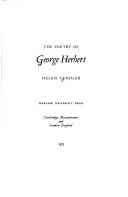
ISBN: 0674679598 Year: 1975 Publisher: Cambridge, Mass.
Abstract | Keywords | Export | Availability | Bookmark
 Loading...
Loading...Choose an application
- Reference Manager
- EndNote
- RefWorks (Direct export to RefWorks)
Herbert, George --- Herbert, George, --- Criticism and interpretation --- Christian poetry, English --- -English Christian poetry --- English poetry --- -Criticism and interpretation --- History and criticism. --- Criticism and interpretation. --- -Herbert, George --- History and criticism --- Harbert, George,
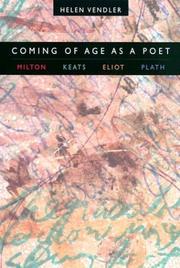
ISBN: 0674013832 9780674013834 Year: 2004 Publisher: Cambridge, Mass. Harvard University Press
Abstract | Keywords | Export | Availability | Bookmark
 Loading...
Loading...Choose an application
- Reference Manager
- EndNote
- RefWorks (Direct export to RefWorks)
Milton, John --- Plath, Sylvia --- Eliot, T.S. --- Keats, John
Book
ISBN: 0571170781 Year: 1995 Publisher: London Faber and Faber
Abstract | Keywords | Export | Availability | Bookmark
 Loading...
Loading...Choose an application
- Reference Manager
- EndNote
- RefWorks (Direct export to RefWorks)
Poetry --- American literature --- anno 1900-1999 --- LOWELL (ROBERT) --- DOVE (RITA) --- GRAHAM (JORIE) --- POESIE AMERICAINE --- LITERATURE --- POETRY --- U.S.
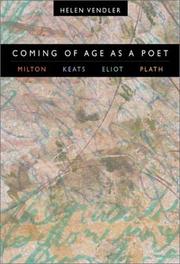
ISBN: 0674010248 Year: 2003 Publisher: Cambridge (MA) : Harvard University Press,
Abstract | Keywords | Export | Availability | Bookmark
 Loading...
Loading...Choose an application
- Reference Manager
- EndNote
- RefWorks (Direct export to RefWorks)
820-1 --- American poetry --- -English poetry --- -Maturation (Psychology) in literature --- English literature --- American literature --- Engelse literatuur: poëzie --- History and criticism --- Eliot, T. S. --- -Keats, John --- -Milton, John --- -Plath, Sylvia --- Lucas, Victoria --- Hughes, Sylvia --- Plat, Silvii︠a︡ --- Plaṭ, Silviyah --- פלאת, סילביה --- 西爾維婭.普拉斯 --- Plathová, Sylvia --- Phlǣt, Silwīya --- Criticism and interpretation --- Criticism and interpretation. --- English poetry --- Maturation (Psychology) in literature. --- History and criticism. --- 820-1 Engelse literatuur: poëzie --- Maturation (Psychology) in literature --- Keats, John, --- Milton, John, --- Plath, Sylvia --- Kēts, Tzōn, --- Kits, Dzhon, --- Kʻichʻŭ, --- Ai-lüeh-tʻe, --- Eliot, Thomas Stearns, --- Īliyūt, T. S., --- Elliŏtʻŭ, --- Eliot, Thōmas S., --- Eliot, Th. S., --- Eliot, Thomas Stern, --- Elyoṭ, T. S., --- Ėliot, Tomas Stirns, --- אליוט ט.ס --- אליוט, ת. ס. --- English-speaking countries --- Intellectual life. --- Eliot, Thomas Stearns --- Milton, John --- Milṭan, Jān, --- Milʹton, Dzhon, --- Милтон, Джон, --- Miltūn, Zhūn, --- Miltonus, Joannes, --- J. M. --- M., J. --- Milʹton, Īoann, --- Milton, Gioanni, --- Milton, Giovanni, --- מילטאן, יאהאן --- מילטאן, יוחנן --- מילטון, ג׳והן --- מלטן, יוחנן --- キーツ, ジョン --- ENGLISH POETRY --- AMERICAN POETRY --- MILTON (JOHN), 1608-1674 --- KEATS (JOHN), 1795-1821 --- MATURATION (PSYCHOLOGY) IN LITERATURE --- ELIOT (THOMAS STEARNS, DIT T.S.), 1888-1965 --- PLATH (SYLVIA), 1932-1963 --- 20th CENTURY
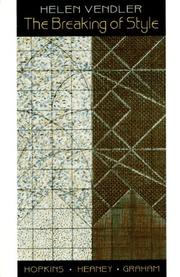
ISBN: 067408120X 0674081218 Year: 1995 Publisher: Cambridge, Mass. ; : London :. Harvard University Press,
Abstract | Keywords | Export | Availability | Bookmark
 Loading...
Loading...Choose an application
- Reference Manager
- EndNote
- RefWorks (Direct export to RefWorks)
English language --- English poetry --- Anglais (Langue) --- Poésie anglaise --- Style --- History and criticism --- Stylistique --- Histoire et critique --- Graham, Jorie, --- Heaney, Seamus, --- Hopkins, Gerard Manley, --- History and criticism. --- Style. --- 820-1 --- Engelse literatuur: poëzie --- 820-1 Engelse literatuur: poëzie --- Poésie anglaise --- English literature --- Metrics and rhythmics --- Rhetoric --- Hopkins, G. M. --- Hopkins, Manley, --- Chēny, Seimous, --- Khini, Sheĭmas, --- Literary style. --- Hopkins, Gerard Manley --- Heaney, Seamus --- Germanic languages --- Anglais (langue) --- Heaney, Seamus (1939-....) --- Graham, Jorie (1951-....) --- Hopkins, Gerard Manley (1844-1889)
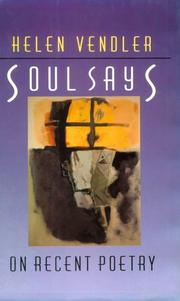
ISBN: 0674821467 Year: 1995 Publisher: Cambridge, Mass. London : Belknap Press of Harvard University Press,
Abstract | Keywords | Export | Availability | Bookmark
 Loading...
Loading...Choose an application
- Reference Manager
- EndNote
- RefWorks (Direct export to RefWorks)
American poetry --- History and criticism. --- Heaney, Seamus (1939-....) --- Poésie américaine --- Critique et interprétation --- 20e siècle --- Histoire et critique --- Poésie américaine --- Critique et interprétation --- 20e siècle
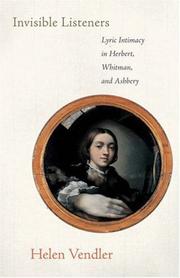
ISBN: 0691116180 069113474X 1282086774 1400826713 9786612086779 9781400826711 9780691134741 9780691134741 9780691116181 Year: 2009 Publisher: Princeton, NJ
Abstract | Keywords | Export | Availability | Bookmark
 Loading...
Loading...Choose an application
- Reference Manager
- EndNote
- RefWorks (Direct export to RefWorks)
When a poet addresses a living person--whether friend or enemy, lover or sister--we recognize the expression of intimacy. But what impels poets to leap across time and space to speak to invisible listeners, seeking an ideal intimacy--George Herbert with God, Walt Whitman with a reader in the future, John Ashbery with the Renaissance painter Francesco Parmigianino? In Invisible Listeners, Helen Vendler argues that such poets must invent the language that will enact, on the page, an intimacy they lack in life. Through brilliantly insightful and gracefully written readings of these three great poets over three different centuries, Vendler maps out their relationships with their chosen listeners. For his part, Herbert revises the usual "vertical" address to God in favor of a "horizontal" one-addressing God as a friend. Whitman hovers in a sometimes erotic, sometimes quasi-religious language in conceiving the democratic camerado, who will, following Whitman's example, find his true self. And yet the camerado will be replaced, in Whitman's verse, by the ultimate invisible listener, Death. Ashbery, seeking a fellow artist who believes that art always distorts what it represents, finds he must travel to the remote past. In tones both tender and skeptical he addresses Parmigianino, whose extraordinary self-portrait in a convex mirror furnishes the poet with both a theory and a precedent for his own inventions. By creating the forms and speech of ideal intimacy, these poets set forth the possibility of a more complete and satisfactory human interchange--an ethics of relation that is uncoerced, understanding, and free.
American poetry --- Authors and readers --- God in literature. --- Intimacy (Psychology) in literature. --- Lyric poetry --- Reader-response criticism. --- History and criticism. --- Whitman, Walt, --- Herbert, George, --- Ashbery, John --- Criticism and interpretation. --- Ashbery, John, --- Reader-oriented criticism --- Reception aesthetics --- Readers and authors --- Harbert, George, --- Criticism --- Reading --- Authorship
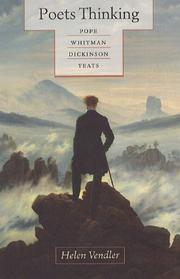
ISBN: 9780674021105 067402110X 0674015673 9780674015678 0674044622 0674268105 Year: 2004 Publisher: Cambridge, Mass. Harvard University Press
Abstract | Keywords | Export | Availability | Bookmark
 Loading...
Loading...Choose an application
- Reference Manager
- EndNote
- RefWorks (Direct export to RefWorks)
The four poets taken up in this volume - Alexander Pope, Walt Whitman, Emily Dickinson and William Butler Yeates - come from three centuries and three nations, and their styles of thinking are characteristically ideosyncratic. Helen Vendler traces these poets' lines to find evidence of thought in lyric.
Whitman, Walt --- Yeats, William B. --- Pope, Alexander --- 820-1 --- 820-1 Engelse literatuur: poëzie --- Engelse literatuur: poëzie --- American poetry --- English poetry --- Thought and thinking --- Mind --- Thinking --- Thoughts --- Educational psychology --- Philosophy --- Psychology --- Intellect --- Logic --- Perception --- Psycholinguistics --- Self --- History and criticism --- Dickinson, Emily, --- Pope, Alexander, --- Whitman, Walt, --- Yeats, W. B. --- D. E. D. I., --- Daemon Est Deus Inversus, --- Ganconagh, --- I., D. E. D., --- Ĭeĭts, U. B. --- Ĭeĭts, Uilʹi︠a︡m Batler, --- Weilian Batele Yezhi, --- Yeats, William Butler, --- Yeṭs, Ṿilyam Baṭler, --- יטס, יטלאם בטלר --- ייטס, ויליאם בטלר, --- 威廉,巴特勒,叶芝, --- Dickinson, Emilia, --- Dickinson, Emily Elizabeth, --- Dickinson, Emily --- Dikinson, Ėmili, --- D̲ikinson, Emily, --- Ti-chin-sen, Ai-mi-li, --- דיקינסון, אמילי, --- Criticism and interpretation. --- English-speaking countries --- Intellectual life. --- Йейтс, У. Б. --- Йейтс, Уильям Батлер, --- Yeats, William Butler --- Ouïtman, Ouōlt, --- Uitman, Uolʹt, --- Uitmen, Uot, --- Uitmen, Uolt, --- Viṭman̲, Vālṭ, --- Vālṭ Viṭman̲, --- Witʻŭmŏn, --- Ṿiṭman, Ṿolṭ, --- Vālṭviṭman̲, --- Waltvitmen, --- Whitman, Walter, --- Huiteman, --- Veeitman, --- Уитмен, Уолт, --- ויטמן, וולט, --- װיטמאן, װאלט, --- ويتمن، والت، --- Vitmen, Volt, --- Uitman, Uollt, --- Huiteman, Huate, --- 華特·惠特曼, --- Popiĭ, Aleksandr, --- Barnivelt, Esdras, --- Poup, Aleksandr, --- Dykinsan, Ėmili, --- Thought and thinking. --- History and criticism. --- Yeats, William Butler (1865-1939) --- Dickinson, Emily (1830-1886) --- Pope, Alexander (1688-1744) --- Whitman, Walt (1819-1892) --- Poésie anglaise --- Poésie américaine --- Pensée --- Pays de langue anglaise --- Critique et interprétation --- Histoire et critique --- 19e siècle --- Vie intellectuelle
Book
ISBN: 9783938593080 3938593083 Year: 2007 Volume: 88 Publisher: München Carl Friedrich von Siemens Stiftung
Abstract | Keywords | Export | Availability | Bookmark
 Loading...
Loading...Choose an application
- Reference Manager
- EndNote
- RefWorks (Direct export to RefWorks)
| Listing 1 - 10 of 49 | << page >> |
Sort by
|

 Search
Search Feedback
Feedback About UniCat
About UniCat  Help
Help News
News